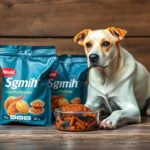
Introduction
When it comes to our beloved canine companions, dog nutrition plays a pivotal role in their overall health and well-being. Just like humans, dogs require a balanced diet that provides essential nutrients to thrive. As pet owners, many of us enjoy sharing snacks with our dogs, and cashews have become a popular choice. But can dogs eat cashews safely? In this article, we will delve into the implications of cashews for canine health and help you make informed decisions about including this nut in your dog’s diet.
Understanding Dog Nutrition
The Basics of Canine Diet
A well-rounded diet for dogs consists of several essential nutrients, including proteins, fats, carbohydrates, vitamins, and minerals. Each of these nutrients plays a unique role in maintaining your dog’s health:
- Proteins are crucial for growth, repair, and overall function.
- Fats provide energy and support cell structure.
- Carbohydrates offer a quick energy source and help in digestion.
- Vitamins and minerals are vital for various physiological processes.
It’s important to tailor your dog’s diet to their size, age, and activity level. A puppy may require more protein for growth, while an older dog may benefit from a diet lower in fat.
Common Human Foods and Dogs
The trend of sharing human food with dogs can be appealing, but it comes with risks and benefits. Some human foods can provide additional nutrients, while others may be harmful or even toxic. Understanding which foods are safe is crucial for maintaining your dog’s health.
Nuts and Dogs
General Overview of Nuts
Nuts are a common snack for humans, known for their nutritional benefits, including healthy fats, protein, and fiber. However, not all nuts are safe for dogs. Some popular nuts that humans consume include:
- Almonds
- Walnuts
- Pecans
- Macadamia nuts
- Cashews
While nuts can provide certain health benefits, they can also pose risks to dogs due to their high-fat content and potential toxins.
Are Nuts Safe for Dogs?
Not all nuts are safe for canine consumption. For instance, macadamia nuts are highly toxic to dogs, causing symptoms like weakness, vomiting, and tremors. Similarly, almonds can be difficult for dogs to digest and may lead to gastrointestinal upset. Understanding the risks associated with nuts is vital before sharing these snacks with your furry friend.
Can Dogs Eat Cashews?
Nutritional Profile of Cashews
So, can dogs eat cashews? Let’s explore the nutritional content of cashews. These nuts contain:
- Healthy fats: Primarily monounsaturated fats, which are beneficial for heart health.
- Protein: A good source of plant-based protein.
- Vitamins: Cashews are rich in vitamins E, K, and B6.
- Minerals: They provide essential minerals like magnesium, phosphorus, and zinc.
The potential health benefits of cashews for dogs include improved heart health and a shiny coat, thanks to their healthy fat content and vitamins.
Risks of Feeding Cashews to Dogs
Despite their benefits, there are risks associated with feeding cashews to dogs. Here are some key considerations:
- Moderation is Key: Cashews should be treated as an occasional treat rather than a regular part of your dog’s diet. Overconsumption can lead to weight gain and obesity.
- Allergic Reactions: Some dogs may be allergic to nuts, including cashews. Signs of an allergic reaction can include itching, swelling, and gastrointestinal distress.
- Digestive Issues: Feeding cashews can lead to digestive issues, including diarrhea or upset stomach, especially if your dog is not accustomed to high-fat foods.
- Unsalted and Unseasoned: Always choose unsalted and unseasoned cashews. Salt and seasoning can be harmful to dogs, leading to health complications.
Recommendations for Feeding Cashews to Dogs
If you decide to introduce cashews into your dog’s diet, consider the following guidelines:
- Introduce Gradually: Start with a small amount to see how your dog reacts. Monitor for any adverse effects.
- Serving Sizes: The appropriate serving size depends on your dog’s size and breed. A small dog may only need a half or one cashew, while larger breeds can handle a few more. Always err on the side of caution.
- Consult Your Veterinarian: Before making any significant changes to your dog’s diet, it’s crucial to consult your veterinarian for personalized advice.
Alternative Treats for Dogs
Healthier Snack Options
If you’re looking for dog-friendly treats that offer nutritional benefits, consider these alternatives:
- Fruits: Apples (without seeds), blueberries, and bananas are excellent choices for a healthy snack.
- Vegetables: Carrots and green beans can serve as crunchy, low-calorie treats.
- Safer Nut Options: Peanuts (unsalted and unseasoned) can be a safer nut to offer in moderation.
Homemade Treat Recipes
Creating your own dog treats at home can ensure they are healthy and tailored to your dog’s dietary needs. Here are two simple recipes to try:
Peanut Butter Banana Treats
Ingredients:
– 1 ripe banana
– 1/2 cup peanut butter (unsalted)
– 1 cup oats
Instructions:
1. Preheat your oven to 350°F (175°C).
2. Mash the banana and mix it with peanut butter.
3. Stir in the oats until well combined.
4. Roll into small balls or flatten into shapes on a baking sheet.
5. Bake for 15-20 minutes until golden brown.
Sweet Potato Chews
Ingredients:
– 1 sweet potato
Instructions:
1. Preheat your oven to 250°F (120°C).
2. Slice the sweet potato into thin strips.
3. Place on a baking sheet and bake for 2-3 hours until dried and chewy.
4. Allow to cool before serving.
Conclusion
In summary, while cashews can be safe for dogs in moderation, it’s essential to be aware of the potential risks involved. A balanced diet tailored to your dog’s needs is crucial for their overall health. Always consult your veterinarian before introducing new foods and prioritize safer snacks like fruits and vegetables. The key to a healthy dog is moderation, variety, and a focus on nutritious options.
FAQs
Can puppies eat cashews?
Puppies should generally avoid cashews due to their sensitive digestive systems. It’s best to stick to puppy-specific food and treats until they are older.
What should I do if my dog eats a large amount of cashews?
If your dog consumes a large quantity of cashews, monitor them closely for signs of distress. Contact your veterinarian if you notice any unusual behavior or symptoms.
Are there any nuts that are beneficial for dogs?
Peanuts, in moderation and unsalted, can be a safe nut option for dogs. However, always consult your veterinarian before introducing any new food.
How can I tell if my dog is allergic to cashews?
Signs of an allergy may include itching, swelling, hives, or gastrointestinal upset. If you suspect an allergy, consult your veterinarian for advice and potential testing.
References
- Veterinary guidelines on canine nutrition
- Studies on the impact of nuts in dog diets
- Recommendations from pet nutrition experts









